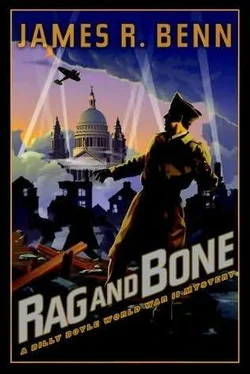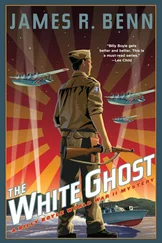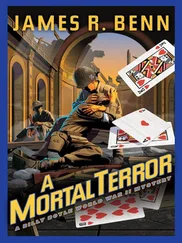James Benn - Rag and Bone
Здесь есть возможность читать онлайн «James Benn - Rag and Bone» весь текст электронной книги совершенно бесплатно (целиком полную версию без сокращений). В некоторых случаях можно слушать аудио, скачать через торрент в формате fb2 и присутствует краткое содержание. Жанр: Шпионский детектив, на английском языке. Описание произведения, (предисловие) а так же отзывы посетителей доступны на портале библиотеки ЛибКат.
- Название:Rag and Bone
- Автор:
- Жанр:
- Год:неизвестен
- ISBN:нет данных
- Рейтинг книги:4 / 5. Голосов: 1
-
Избранное:Добавить в избранное
- Отзывы:
-
Ваша оценка:
- 80
- 1
- 2
- 3
- 4
- 5
Rag and Bone: краткое содержание, описание и аннотация
Предлагаем к чтению аннотацию, описание, краткое содержание или предисловие (зависит от того, что написал сам автор книги «Rag and Bone»). Если вы не нашли необходимую информацию о книге — напишите в комментариях, мы постараемся отыскать её.
Rag and Bone — читать онлайн бесплатно полную книгу (весь текст) целиком
Ниже представлен текст книги, разбитый по страницам. Система сохранения места последней прочитанной страницы, позволяет с удобством читать онлайн бесплатно книгу «Rag and Bone», без необходимости каждый раз заново искать на чём Вы остановились. Поставьте закладку, и сможете в любой момент перейти на страницу, на которой закончили чтение.
Интервал:
Закладка:
“It could be bombing weather tonight,” Kaz said, scanning the sky.
“You don’t think it was an isolated raid?”
“No, I don’t think so. Have you noticed the newspapers haven’t reported it yet? They don’t want it to appear as if it’s a new phase of the Blitz, but it could be. If there’s another attack, they’ll probably report it as nothing more than a nuisance raid, to keep morale up. The Germans will likely report a thousand planes destroyed the London docks. If you want the truth in this war, the last place to look is in a newspaper.”
“Where, then?” I asked.
“To people like Eddie Miller, and those who pay them.”
“Who did you pay, Kaz, when you were with the Poles?”
“Ah, a gentleman does not kiss and tell, or reveal his sources. There are Eddie Millers everywhere.”
“Are there Russian Eddies?”
“They proved quite difficult. There is a tremendous amount of fear, and of course they only go about in groups. It is hard to speak to a Russian alone.”
“There was another guy in the room the whole time I was speaking to Sidorov.”
“That is their system, which makes the killing of Egorov intriguing. Although the NKVD must be above the rules. I’m quite curious to meet this Captain Sidorov.”
“You feel OK about going?”
“Yes, I don’t think there will be overt hostility. As long as you don’t fall asleep during the opera.”
“Elbow me if I snore. Looks like quite a gathering ahead,” I said, pointing to a line of cars parked in front of the embassy. British and American staff cars, black Rolls-Royces, and other private cars disgorged officers and ladies who made their way through a covered walkway into a formal side entrance. No burly guys in ill-fitting suits frisking these guests, just a Red Army officer with a clipboard.
“Lieutenants Kazimierz and Boyle, welcome, on behalf of the peace-loving people of the Union of Soviet Socialist Republics. I am Captain Rak Vatutin. Please, go in and enjoy some refreshments before the film starts. There will be a reception afterward.”
“Thanks. How long is the film?” I asked.
“I have not seen it yet,” Vatutin said. “But the opera is four acts with an epilogue. There is an intermission,” he said with an apologetic smile.
We entered a large hallway filled with a mix of elegant evening gowns and dress uniforms. There were half a dozen colors, from the steel blue of the Red Air Force to the dark blues of three navies and the brown and khaki of Yanks, Brits, and Russians amidst a smattering of diplomats in tuxedos. I spotted Sidorov and he glided over, glad-handing as he went, the confident, genial host.
“Captain Kiril Sidorov at your service, Lieutenant Kazimierz. Thank you so much for coming. Lieutenant Boyle, it is good to see you again.”
“Thanks for the invite, Captain. What’s the occasion?”
“Simply a cultural event, to show the world that even in the midst of war against the Fascist aggressor, the Soviet Union still attends to the arts. We often screen new films as they make their way here from Moscow.”
“You’re a busy man,” I said. “Aren’t you in the middle of planning Operation Frantic?”
“Billy,” Kaz said, “one does not bring up names directly, especially at an event like this.”
“You Americans are so direct, aren’t you?” Sidorov said. “Lieutenant Kazimierz is correct, and not simply about the social niceties. The walls have ears, as the ancient Greek said. So, I must say, I have no idea what you are talking about. Here, have some vodka.” He signaled to a waiter, who brought a tray of tall, thin glasses over.
“To victory,” Sidorov said.
“To victory and freedom,” Kaz said. We drank, and three more glasses appeared.
“You must eat something,” Sidorov said. “There are only a few minutes before we must be seated.” He led us to a long table, where senior brass were feeding like locusts. “We call this zukuski, little bites. Things to eat while you drink vodka. Enjoy, please, and I will see you inside.” He snapped his fingers, and Vatutin, fresh from clipboard duty, joined us. He guided us through a selection of pickled onions, caviar tarts, salmon pastry, beet salad, and half a dozen things I didn’t recognize.
“Why do we rate all this attention?” I said as Vatutin went off in a search of a fresh tray of cold vodka. “Why do a couple of lieutenants get the royal treatment, in the midst of this high society?”
“Perhaps Sidorov took a liking to you,” Kaz said. “I see what you mean about him. He is not as heavy-handed as most Russians, although he says all the right words.”
“Think he believes them?”
“In their system, belief does not matter as much as obedience. If he has survived this long, and has been posted here, it is because he is trusted and connected.”
“Family connections?”
“Not his family. We did manage to pick up a few tidbits of gossip about Kiril Sidorov. His parents died of typhus, and he was raised in a Soviet orphanage. From there he went straight into the Komsomol, the Communist youth organization. As soon as he was old enough, he began service with the NKVD border guards. Shortly before the war, he was transferred to internal security, courtesy of his wife’s father.” Kaz interrupted his story to wolf down another caviar tart.
“How do you know all this, and why didn’t you tell me before?”
“Not every waiter and maid who works here is Russian,” Kaz whispered. “The walls do have ears. I couldn’t tell you before, but now I work for General Eisenhower, and I owe it to you to tell what I know, little that it is. No more than gossip, really.”
“Gossip about Sidorov’s wife? He mentioned that she worked in Moscow at the Propaganda Ministry.”
“Yes, she does. The talk is that he married well. Her father is an official in the People’s Commissariat for Justice, and that, combined with Sidorov’s intelligence and his all-Soviet upbringing, marked him as a fast-rising Red star.” Kaz stopped to smile at his own joke. “The posting here is undoubtedly a reward, and an indication that he is being groomed for higher service. He has a wife and child in Moscow, so they are fairly certain of his return.”
“Fairly?”
“One never knows about a man’s home life, or his inner life, so how could anything be certain?”
“I’m not certain of much, Kaz, except that you’ll never get me to eat fish eggs.”
“Here, comrades,” Vatutin said, easing up to us with three glasses. Ice cold vodka. One for the road, as you Americans say, yes?”
“Yes,” Kaz said, raising his glass. “To Poland. First to fight.”
“To Poland,” Vatutin said, downing the vodka in one shot, and licking his lips, his drunkenness showing through the veil of diplomacy and courtesy. His eyes lingered on Kaz before his jovial mask returned. “Come, the film is about to start. I will take you to your seats.”
I followed, feeling the warmth of the alcohol spread in my belly as a haze of dullness clouded my mind. Something told me to be careful, but I wasn’t sure why or of what or whom. Vatutin led us into a ballroom with a screen set up at one end. Our seats were up front, not in the first two rows with the bigwigs, but in the third, where Sidorov waited, chatting with Colonel Harding and Major Cosgrove. I would have been more impressed if the film was Casablanca. Some pea-brain diplomat had decided that French officials might not like how Vichy was depicted in it, so it was held back from the movies they sent to North Africa, and I never got to see it. The lights dimmed, and the crowd settled into their seats, the conversations and rustles of finery fading as the whir of the projector and the first seconds of static and flickering images of Russian lettering filled the screen. It went dark, and the opening credits rolled by in the odd undecipherable script, the opening scene showing a medieval village, with an old white-bearded guy center stage. Ivan Susanin, my guess. Everybody sang for a while, and then some soldiers marched in-the home team, from the reception they got. More singing. A girl, she looked to be Ivan’s daughter, was evidently sweet on one of the soldiers. They went up to Ivan, and the guy went through the age-old ritual of asking for her hand. Ivan said no. He wasn’t mad at the guy; he seemed to be explaining something to both of them. More singing and crying, until someone comes in with big news, and everyone celebrates. I think the kids can get married now. Scene fades to black.
Читать дальшеИнтервал:
Закладка:
Похожие книги на «Rag and Bone»
Представляем Вашему вниманию похожие книги на «Rag and Bone» списком для выбора. Мы отобрали схожую по названию и смыслу литературу в надежде предоставить читателям больше вариантов отыскать новые, интересные, ещё непрочитанные произведения.
Обсуждение, отзывы о книге «Rag and Bone» и просто собственные мнения читателей. Оставьте ваши комментарии, напишите, что Вы думаете о произведении, его смысле или главных героях. Укажите что конкретно понравилось, а что нет, и почему Вы так считаете.












